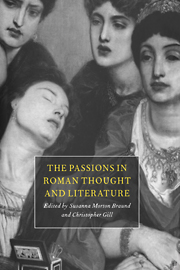Book contents
- Frontmatter
- Contents
- Preface
- Conventions
- Introduction
- 1 Epicurean anger
- 2 Cicero and the expression of grief
- 3 The subjugation of grief in Seneca's Epistles
- 4 A passion unconsoled? Grief and anger in Juvenal Satire 13
- 5 Passion, reason and knowledge in Seneca's tragedies
- 6 Imagination and the arousal of the emotions in Greco-Roman rhetoric
- 7 Pity, fear and the historical audience: Tacitus on the fall of Vitellius
- 8 All in the mind: sickness in Catullus 76
- 9 Ferox uirtus: anger in Virgil's Aeneid
- 10 ‘Envy and fear the begetter of hate’: Statius' Thebaid and the genesis of hatred
- 11 Passion as madness in Roman poetry
- Bibliography
- Index of ancient passages
- General index
1 - Epicurean anger
Published online by Cambridge University Press: 18 December 2009
- Frontmatter
- Contents
- Preface
- Conventions
- Introduction
- 1 Epicurean anger
- 2 Cicero and the expression of grief
- 3 The subjugation of grief in Seneca's Epistles
- 4 A passion unconsoled? Grief and anger in Juvenal Satire 13
- 5 Passion, reason and knowledge in Seneca's tragedies
- 6 Imagination and the arousal of the emotions in Greco-Roman rhetoric
- 7 Pity, fear and the historical audience: Tacitus on the fall of Vitellius
- 8 All in the mind: sickness in Catullus 76
- 9 Ferox uirtus: anger in Virgil's Aeneid
- 10 ‘Envy and fear the begetter of hate’: Statius' Thebaid and the genesis of hatred
- 11 Passion as madness in Roman poetry
- Bibliography
- Index of ancient passages
- General index
Summary
The passion of anger is beset by ambivalence. One aspect of this was noted already by Aristotle, in his famous remark at the beginning of De anima that the physicist and the dialectician would define anger differently: the latter would call it something like the desire for retribution, the former a boiling of the blood and heat around the heart:
Hence a physicist would define an affection of soul differently from a dialectician: the latter would define e.g. anger as the appetite for returning pain, or something like that, while the former would define it as a boiling of the blood or warm substance surrounding the heart. The one assigns the material conditions, the other the form or account; for what he states is the account of the fact, though for its actual existence there must be embodiment of it in a material such as is described by the other … Which, then, amongst these is entitled to be registered as the genuine physicist? The one who restricts himself to the material, or the one who restricts himself to the account alone? Is it not rather the one who combines both?
This dual physiological and cognitive aspect of the passion remains in modern discussions. There is undoubtedly a physiology of anger, which was for long the focus of interest for psychologists: in the celebrated James–Lange view of the emotions (see Cannon (1927)), the physiological effects were made the causes of the psychological manifestations. My blood does not boil because I want to get back at my enemy, but I am angry because my blood boils.
- Type
- Chapter
- Information
- The Passions in Roman Thought and Literature , pp. 16 - 35Publisher: Cambridge University PressPrint publication year: 1997
- 19
- Cited by



